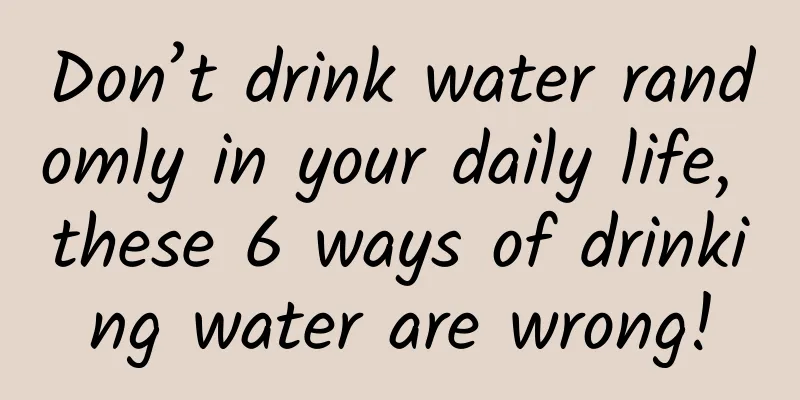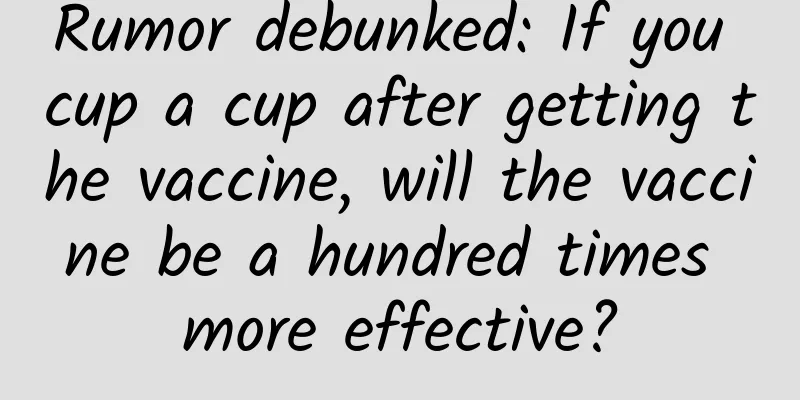Don’t drink water randomly in your daily life, these 6 ways of drinking water are wrong!

|
Author: Xue Qingxin, registered dietitian Reviewer: Zhang Yu, researcher at Chinese Center for Disease Control and Prevention Have you drunk water today? Water is important for maintaining life. All activities of the body cannot be separated from the participation of water. If you lose water seriously, it will endanger your life. Figure 1 Copyright image, no permission to reprint Although we need to drink water every day, there are scientific ways to drink water. Drinking water incorrectly may be harmful to your health. This article sorts out 6 incorrect ways to drink water. Check to see if you have made any mistakes. Myth 1: Drinking too much water at once I often receive concerns from my family: "Drink more water, drink more water." Drinking more water is indeed a good habit, but drinking too much water at one time can also be bad. When water intake exceeds the kidney's ability to excrete water, it may lead to water intoxication. However, water intoxication is relatively rare in normal healthy people, and is more common in people with kidney disease, liver disease, and congestive heart failure. In addition, for people who exercise a lot or sweat a lot due to high-temperature work, if they drink a lot of water without electrolytes, it will aggravate the decrease in plasma osmotic pressure, leading to further loss of electrolytes in the blood, interstitial fluid, and intracellular fluid with high osmotic pressure due to dehydration. At this time, if you drink too much water at one time, it may cause death! This is not an exaggeration. In 2007, a 22-year-old British man died during a marathon because he drank too much water in a short period of time without replenishing electrolytes. For the general population, it is best to follow the recommendations of the Chinese Dietary Guidelines. Men and women need to drink 1700 ml and 1500 ml of water per day, respectively, such as boiled water, bottled water, packaged drinking water, natural mineral water, natural spring water, etc. You can also drink light tea, lemonade, mint water, unsweetened mung bean soup and sour plum soup, etc. You should replenish water in small amounts and multiple times, 200 to 300 ml each time, and don't drink too much at one time. Myth 2: Wait until you are thirsty to drink water People sometimes forget to drink water because they are busy at work, and only go to drink water when they feel obviously thirsty. In fact, when you feel "thirst", your body has already begun to lack water. When the body loses 2% of its body weight, it will feel thirsty. This is because when the body lacks water, the osmotic pressure receptors in the hypothalamus will sense the increase in the osmotic pressure of the internal environment, and then transmit this signal to the cerebral cortex, causing the brain to release a "thirst" signal. If you feel thirsty but do not replenish water in time, it will affect your body temperature regulation and cause mild discomfort. If it is more serious, it will affect your mood and cause irritability, headache, inattention, etc. Especially for the elderly, it is important to pay attention to replenishing water regularly and quantitatively, because the elderly have a reduced tolerance to water shortage, but are not as sensitive to "thirst" as they were when they were young. In many cases, the body has begun to lack water, but there is no feeling of thirst. Therefore, you must develop the habit of actively drinking water. If you find that your urine has become noticeably yellow without taking B vitamins, it means that your body may be dehydrated and you need to drink water as soon as possible. Figure 2 Source: Dietary Guidelines for Chinese Residents Myth 3: Drinking strong tea instead of water Drinking tea has a long history in my country and is an indispensable part of Chinese traditional culture. Drinking tea regularly is good for health, but it should be noted that strong tea cannot replace water. Figure 3 Copyright image, no permission to reprint This is because the oxalic acid in strong tea may reduce the absorption of calcium in the small intestine, increasing the risk of osteoporosis; it may also increase the formation of calcium oxalate stones and increase the risk of kidney stones; it may also interfere with the absorption and utilization of the mineral iron, increasing the risk of anemia. Therefore, we can occasionally drink strong tea, or weak tea, but never replace plain water with strong tea. In addition, the water temperature for brewing tea should be controlled at 60-80℃, so that more tea polyphenols can be taken in. Myth 4: Drinking beverages instead of water Some people may not like to drink "tasteless" boiled water, but they like sweet drinks, so they drink several bottles at a time, thinking that this can be regarded as replenishing water for the body. In fact, sugary sweet drinks have a higher osmotic pressure than boiled water, which is not conducive to replenishing water. Instead, the more you drink, the more thirsty you will be. In addition, drinking sugary drinks will also lead to the intake of more added sugar and calories, which will also increase the risk of obesity, gout, tooth decay, etc. Even sugar-free drinks are not recommended to be drunk frequently. This year, the World Health Organization (WHO) issued a new guideline on non-sugar sweeteners, recommending against the use of non-sugar sweeteners to control weight. It does not help with weight control and may even have some potential adverse effects, such as increasing the risk of type 2 diabetes, cardiovascular disease and death in adults. In other words, this sugar-free beverage containing non-sugar sweeteners is not a healthy drink, so do not consume it in excess. Non-sugar sweeteners mainly include acesulfame potassium, aspartame, Edwardmantine, cyclamate, neotame, saccharin, sucralose, stevia and stevia derivatives. Myth 5: Drinking too hot water It is OK to drink hot water, but don't drink water that is too hot. Some people just like to drink water that is hot enough to scald their mouths, thinking that water at this temperature is the "best to drink". People who have this habit should be careful. If you develop the habit of drinking hot water, it may increase your risk of cancer. Figure 4 Copyright image, no permission to reprint Hot drinks over 65°C have been listed as Class 2A carcinogens by the International Agency for Research on Cancer under the World Health Organization, which means "may cause cancer to humans". After all, our esophageal mucosa is very delicate and cannot withstand excessive temperatures. Generally, 10-40°C is the most suitable temperature for the esophagus, and 50-60°C is barely tolerable, but above 65°C will cause burns. There is no obvious feeling after the esophagus is burned, and it is difficult for people to feel it. For people who have the habit of drinking hot water, the esophagus is repeatedly burned and self-repaired. In the long run, it will increase the risk of esophageal cancer. Myth 6: Drinking raw water directly Sometimes when you travel to a beautiful place, you may find that the water from a stream or well is very clean, so you may want to drink some. However, for safety reasons, it is best not to drink raw water directly! Raw water may contain eggs of certain parasites and bacteria, especially river water, stream water, etc. No matter how clear it is, you should never drink it directly! Even tap water should be boiled before drinking. References [1] Chinese Nutrition Society. Dietary Guidelines for Chinese Residents[M]. People's Medical Publishing House. 2022 [2] Gou Jing, Yue Jianbiao, Yi Song, et al. Investigation on the influencing factors and related knowledge of osteoporosis among the elderly aged 60 years and above in Chengdu[J]. Practical Preventive Medicine, 2022, 29(7): 782-786. [3] Chen Guanlin, Deng Xiaoting, Gao Yongqing. Study on the correlation between drinking water quality and amount and kidney stones[J]. Chongqing Medicine, 2013, 42(4): 426-428. [4] Mi Zhi, Liu Lizhen, Wu Xiaohong, et al. Effect of brewing conditions on the yield of tea polyphenols in sunshine green tea[J]. Food Research and Development, 2021, 42(3): 63-67. [5] WHO advises not to use non-sugar sweeteners for weight control in newly released guideline[EB/OL]. (2023-05-15)[2023-05-117]. |
<<: Before launch, their engines must come here for a "test"!
>>: Why do most refrigerators open from left to right, but microwaves do the opposite?
Recommend
Pink pink pink pink...pink attack, are you ready?
The recently released "Barbie" created ...
How to write a hit title that generates traffic?
How important is a good title? David Ogilvy, the ...
Alibaba Mini Program Customization Company, how much does it cost to customize a hotel mini program?
What is the price for customizing the Ali Hotel m...
Buying second-hand saves money and is environmentally friendly, but how can you avoid making mistakes?
Have you been eyeing a new camera, game console o...
How effective are noise-canceling headphones? Are they truly noise-canceling or just a waste of money?
The rapid development of science and technology h...
Lychees have such a high sugar content, why do people still suffer from low blood sugar after eating them?
Produced by: Science Popularization China Author:...
A thorough explanation of the product logic behind the lucky draw
I just recently completed a lottery project, and ...
The merger of Feifan Automobile is almost certain. No matter who breaks the impasse, time is no longer on SAIC's side.
Recently, there are reports that SAIC Feifan Auto...
Big Data Has a Big Potential - Article
On March 28, Southern Metropolis Daily Entertainm...
Why are mobile phones getting heavier?
In fact, you can find that mobile phones in the p...
Introduction to 360 search brand direct advertising promotion!
360 Brand Direct Advertising Introduction to the ...
New discovery: meteorites brought water to Earth. Are meteorites the source of life?
Scientists discover liquid water in meteorites, c...
How can an undersea tunnel built between two places “run in both directions”?
From Ningbo to Zhoushan, a project is under const...
【WP Development】Realize the "Shake" function
Although I log in to WeChat once every eight mont...
If you find this kind of rice, you must protect it! It is as precious as the giant panda
If you come across a weed-like plant in the wild ...









